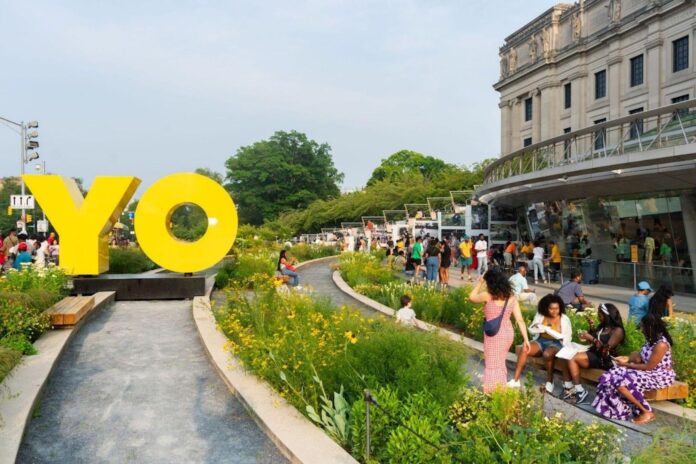Eight arts organisations based in Brooklyn—all led by Black, Indigenous and other people of colour—are part of an inaugural cohort that will receive specialised training to help them sustain their operations through a new programme launched by the Brooklyn Museum and the Joe and Clara Tsai Foundation’s Social Justice Fund (SJF).
The initiative, called the Brooklyn Arts Leadership Collaborative, will bring together the organisations’ leaders in workshops and other sessions facilitated by seasoned figures in the world of arts non-profits in hopes of empowering and strengthening community bonds among groups that are historically under-resourced. As a 2022 report by HueArts found, arts entities lead by people of colour face chronic underinvestment and rarely have permanent spaces, despite playing a vital role in their communities.
The inaugural cohort consists of Black Trans Femmes in the Arts, the Redhawk Native American Arts Council, ¡Oye! Group, the theatre groups Rooted Theater Company and Kyoung’s Pacific Beat and several youth-oriented groups—ARTE (Art and Resistance Through Education), Black Girls Sew and the Brooklyn United Music and Arts Program. Each was selected through an application process that prioritised organisations with operating budgets of $500,000 or less. They were chosen for their deep commitment to their communities as well as their social-justice advocacy. Each non-profit will also receive a $25,000 grant from SJF.
“These are organisations that do so much with so little,” cohort leader Robyne Walker Murphy, formerly the executive director of the arts non-profit Groundswell, tells The Art Newspaper. “They’re showing that they’re resilient already, that they already have creative thinking and creative problem-solving. What I wanted to do with building the curriculum is say: What is missing? How are we giving Bipoc organisations access to funders? How are we putting them in contact with a dream team of facilitators who have done the work?”
Over the course of ten months, cohort members will attend sessions around financial management, strategic planning and programme development, among other topics. Guest speakers will include Kemi Ilesanmi, former executive director of the Laundromat Project; the poet Ama Codjoe; and Chiwoniso Kaitano, executive director of MacDowell.
Murphy emphasises that the curriculum will not take what she calls a “traditional, deficit-based model” that assumes a lack of leadership skills. Rather, it will adapt to the organisations’ needs, including providing them with health and wellness resources. “Non-profit burnout is real,” she says. “And what we know in general is that Black and Brown folks and people of colour can have some health disparities based on the amount of stress that they deal with.”
The Brooklyn Arts Leadership Collaborative grew out of the Brooklyn Museum’s learning and social-impact division, which aims to strengthen the institution’s relationship with local communities. Adjoa Jones de Almeida, the division’s deputy director, and Laval Bryant-Quigley, the museum’s director of community engagement and partnerships, helped conceptualise the initiative and brought on Murphy as a consultant. The museum will also be a host site for all sessions.
“We want to begin to develop newer models for meaningful reciprocal relationships and recognise the unique expertise that these organisational leaders have,” Bryant-Quigley says. “And though our goal is to provide space, it’s really to invite leaders to engage with the museum in more meaningful ways—connect with our curators, our collection and the community, and just amplify them through our channels and the resources we have as a historical institution.”
The programme arrives at a critical moment for small- and mid-sized organisations run by people of colour. Many received a funding boost during the height of the pandemic, whether through emergency grants or community donations, but those funds have not necessarily been sustained. “There was this will, like, Let’s solve racism and give all this money,” Murphy says, reflecting on her final years at Groundswell. “But you knew that this money was going to dry up.”
Whether the Brooklyn Arts Leadership Collaborative continues as a recurring programme depends on discussions between the Brooklyn Museum and SJF. But the initiative, Murphy says, reflects a vital recognition of the precarity of local organisations, and “a representation of how more Bipoc-led non-profits are supporting each other, sharing resources with one another”, she says.
She adds, “What’s important is we’re seeing that these organisations are finding ways to come together and realising that, even though this is a rat race in funding that asks us to compete against one another, we are a we.”

























